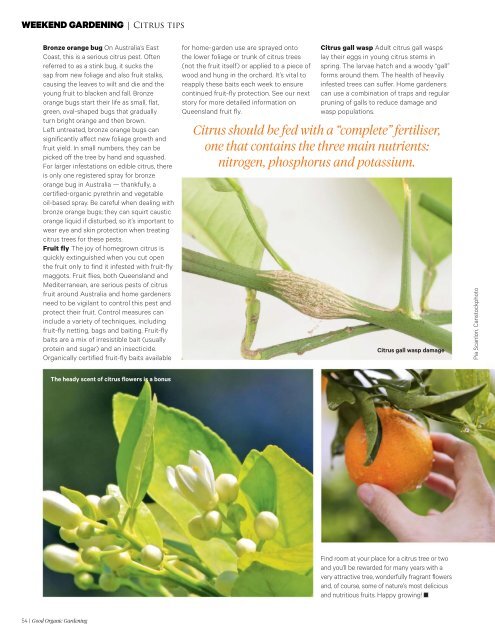5. Good Organic Gardening - September-October 2016 AvxHome.in
5. Good Organic Gardening - September-October 2016 AvxHome.in
5. Good Organic Gardening - September-October 2016 AvxHome.in
Create successful ePaper yourself
Turn your PDF publications into a flip-book with our unique Google optimized e-Paper software.
WEEKEND GARDENING | Citrus tips<br />
Bronze orange bug On Australia’s East<br />
Coast, this is a serious citrus pest. Often<br />
referred to as a st<strong>in</strong>k bug, it sucks the<br />
sap from new foliage and also fruit stalks,<br />
caus<strong>in</strong>g the leaves to wilt and die and the<br />
young fruit to blacken and fall. Bronze<br />
orange bugs start their life as small, flat,<br />
green, oval-shaped bugs that gradually<br />
turn bright orange and then brown.<br />
Left untreated, bronze orange bugs can<br />
significantly affect new foliage growth and<br />
fruit yield. In small numbers, they can be<br />
picked off the tree by hand and squashed.<br />
For larger <strong>in</strong>festations on edible citrus, there<br />
is only one registered spray for bronze<br />
orange bug <strong>in</strong> Australia — thankfully, a<br />
certified-organic pyrethr<strong>in</strong> and vegetable<br />
oil-based spray. Be careful when deal<strong>in</strong>g with<br />
bronze orange bugs; they can squirt caustic<br />
orange liquid if disturbed, so it’s important to<br />
wear eye and sk<strong>in</strong> protection when treat<strong>in</strong>g<br />
citrus trees for these pests.<br />
Fruit fly The joy of homegrown citrus is<br />
quickly ext<strong>in</strong>guished when you cut open<br />
the fruit only to f<strong>in</strong>d it <strong>in</strong>fested with fruit-fly<br />
maggots. Fruit flies, both Queensland and<br />
Mediterranean, are serious pests of citrus<br />
fruit around Australia and home gardeners<br />
need to be vigilant to control this pest and<br />
protect their fruit. Control measures can<br />
<strong>in</strong>clude a variety of techniques, <strong>in</strong>clud<strong>in</strong>g<br />
fruit-fly nett<strong>in</strong>g, bags and bait<strong>in</strong>g. Fruit-fly<br />
baits are a mix of irresistible bait (usually<br />
prote<strong>in</strong> and sugar) and an <strong>in</strong>secticide.<br />
<strong>Organic</strong>ally certified fruit-fly baits available<br />
for home-garden use are sprayed onto<br />
the lower foliage or trunk of citrus trees<br />
(not the fruit itself) or applied to a piece of<br />
wood and hung <strong>in</strong> the orchard. It’s vital to<br />
reapply these baits each week to ensure<br />
cont<strong>in</strong>ued fruit-fly protection. See our next<br />
story for more detailed <strong>in</strong>formation on<br />
Queensland fruit fly.<br />
Citrus gall wasp Adult citrus gall wasps<br />
lay their eggs <strong>in</strong> young citrus stems <strong>in</strong><br />
spr<strong>in</strong>g. The larvae hatch and a woody “gall”<br />
forms around them. The health of heavily<br />
<strong>in</strong>fested trees can suffer. Home gardeners<br />
can use a comb<strong>in</strong>ation of traps and regular<br />
prun<strong>in</strong>g of galls to reduce damage and<br />
wasp populations.<br />
Citrus should be fed with a “complete” fertiliser,<br />
one that conta<strong>in</strong>s the three ma<strong>in</strong> nutrients:<br />
nitrogen, phosphorus and potassium.<br />
Citrus gall wasp damage<br />
Pia Scanlon, Canstockphoto<br />
The heady scent of citrus flowers is a bonus<br />
F<strong>in</strong>d room at your place for a citrus tree or two<br />
and you’ll be rewarded for many years with a<br />
very attractive tree, wonderfully fragrant flowers<br />
and, of course, some of nature’s most delicious<br />
and nutritious fruits. Happy grow<strong>in</strong>g!<br />
54 | <strong>Good</strong> <strong>Organic</strong> <strong>Garden<strong>in</strong>g</strong>

















